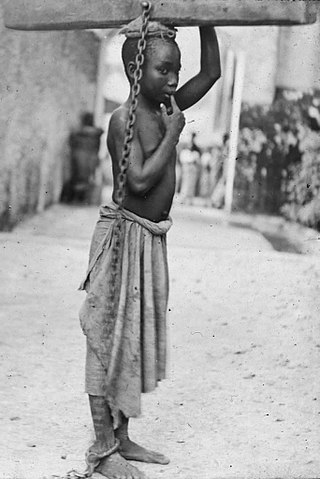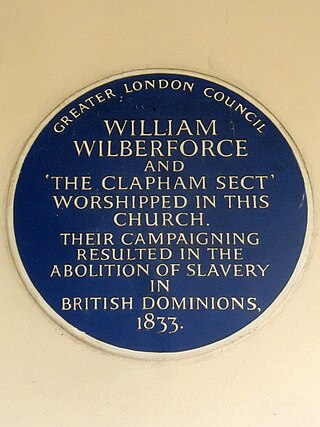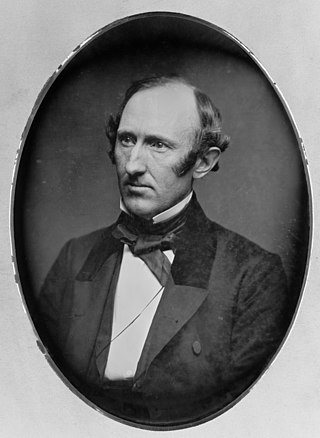Related Research Articles

Abolitionism, or the abolitionist movement, is the movement to end slavery and liberate slaves around the world.

William Wilberforce was a British politician, philanthropist, and a leader of the movement to abolish the slave trade. A native of Kingston upon Hull, Yorkshire, he began his political career in 1780, and became an independent Member of Parliament (MP) for Yorkshire (1784–1812). In 1785, he underwent a conversion experience and became an Evangelical Anglican, which resulted in major changes to his lifestyle and a lifelong concern for reform.

The Clapham Sect, or Clapham Saints, were a group of social reformers associated with Holy Trinity Clapham in the period from the 1780s to the 1840s. Despite the label "sect", most members remained in the established Church of England, which was highly interwoven with offices of state. However, its successors were in many cases outside of the established Anglican Church.

Wendell Phillips was an American abolitionist, advocate for Native Americans, orator, and attorney.

Thomas Clarkson was an English abolitionist, and a leading campaigner against the slave trade in the British Empire. He helped found the Society for Effecting the Abolition of the Slave Trade and helped achieve passage of the Slave Trade Act 1807, which ended British trade in slaves.

Zachary Macaulay was a Scottish statistician and abolitionist who was a founder of London University and of the Society for the Suppression of Vice, and a Governor of British Sierra Leone.

Christian views on slavery are varied regionally, historically and spiritually. Slavery in various forms has been a part of the social environment for much of Christianity's history, spanning well over eighteen centuries. Saint Augustine described slavery as being against God's intention and resulting from sin. In the eighteenth century the abolition movement took shape among Christians across the globe.

The Society for Effecting the Abolition of the Slave Trade, also known as the Society for the Abolition of the Slave Trade, and sometimes referred to as the Abolition Society or Anti-Slavery Society, was a British abolitionist group formed on 22 May 1787. The objective of abolishing the slave trade was achieved in 1807. The abolition of slavery in all British colonies followed in 1833.

Lewis Tappan was a New York abolitionist who dedicated his life efforts to securing freedom for the enslaved Africans aboard the Amistad. He was born in Northampton, Massachusetts, into a Calvinist household.

Henry Ingersoll Bowditch was an American physician and a prominent Christian abolitionist. Bowditch was born on August 9, 1808, in Salem, Massachusetts to Nathaniel Bowditch, a renowned mathematician. He graduated from Harvard College in 1828, earned his medical degree there in 1832, and afterwards studied medicine in Paris for 2 years with leading physicians of the day. From 1859 to 1867 Bowditch was Jackson professor of clinical medicine at Harvard; he later founded the Massachusetts State Board of Health. Bowditch was a fellow of the American Academy of Public Health and wrote a seminal textbook on the subject, Public Hygiene in America (1876).
Elizabeth Heyrick was an English philanthropist and campaigner against the slave trade. She supported immediate, rather than gradual, abolition.

The Underground Railroad in Indiana was part of a larger, unofficial, and loosely-connected network of groups and individuals who aided and facilitated the escape of runaway slaves from the southern United States. The network in Indiana gradually evolved in the 1830s and 1840s, reached its peak during the 1850s, and continued until slavery was abolished throughout the United States at the end of the American Civil War in 1865. It is not known how many fugitive slaves escaped through Indiana on their journey to Michigan and Canada. An unknown number of Indiana's abolitionists, anti-slavery advocates, and people of color, as well as Quakers and other religious groups illegally operated stations along the network. Some of the network's operatives have been identified, including Levi Coffin, the best-known of Indiana's Underground Railroad leaders. In addition to shelter, network agents provided food, guidance, and, in some cases, transportation to aid the runaways.

In the United States, abolitionism, the movement that sought to end slavery in the country, was active from the colonial era until the American Civil War, the end of which brought about the abolition of American slavery, except as punishment for a crime, through the Thirteenth Amendment to the United States Constitution.

Abolitionism in the United Kingdom was the movement in the late 18th and early 19th centuries to end the practice of slavery, whether formal or informal, in the United Kingdom, the British Empire and the world, including ending the Atlantic slave trade. It was part of a wider abolitionism movement in Western Europe and the Americas.
Although many Enlightenment philosophers opposed slavery, it was Christian activists, attracted by strong religious elements, who initiated and organized an abolitionist movement. Throughout Europe and the United States, Christians, usually from "un-institutional" Christian faith movements, not directly connected with traditional state churches, or "non-conformist" believers within established churches, were to be found at the forefront of the abolitionist movements.
James Cropper (1773–1840) was an English businessman and philanthropist, known as an abolitionist who made a major contribution to the abolition of slavery throughout the British Empire in 1833.

Bury the Chains: Prophets and Rebels in the Fight to Free an Empire's Slaves is a non-fiction book by Adam Hochschild that was first published by Houghton Mifflin on January 7, 2005. The book is a narrative history of the late 18th- and early 19th-century anti-slavery movement in the British Empire. The story centers around a group of British abolitionist campaigners and traces their campaign from its beginnings with Somerset v Stewart in 1772 until full emancipation for all British slaves was legally granted in 1838. The book looks at the setbacks the abolitionists faced as well as the campaign tactics they used, and explains how they were ultimately able to end the practice of slavery in Britain.
Nathaniel Paul was a Baptist minister and abolitionist who worked in Albany, New York, Wilberforce Colony in Canada, and traveled to the United Kingdom to raise support to aid African Americans.
Seneca the Younger's Letter 47 of his Epistulae Morales ad Lucilium, sometimes known as On Master and Slave or On Slavery, is an essayistic look at dehumanization in the context of slavery in ancient Rome. It was a criticism of aspects of Roman slavery, without outright opposition to it, and had a favorable later reception by Enlightenment philosophers and subsequently the 19th century abolitionist movement. Conversely, the text has also been seen as a proslavery apologia, as well as in the light of the Stoic philosophical idea that "all men are slaves".
References
- ↑ "END SLAVERY NOW". Breakaway. Archived from the original on 2008-04-22. Retrieved 2008-09-18.
- 1 2 "Just 15, He Leads Fight to Abolish Slavery". ABC News. March 15, 2007. Retrieved 2008-09-18.
- ↑ Hunter, Zach (2011-11-02). "A Christian Ethic of Social Justice: Will A Bible Fill An Empty Stomach?". Huffington Post.